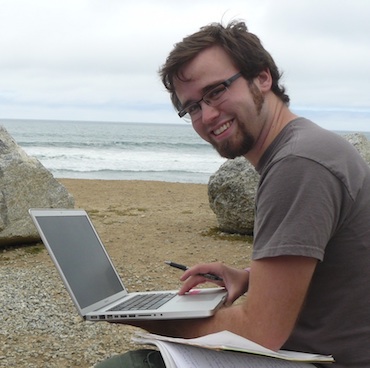Featured Researcher: James Stinecipher
Q: What is the focus of your research, and how did you first get interested in it?
Stinecipher: I’ve always liked mathematical modeling and joining Elliott Campbell’s lab at Merced allowed me to use those skills to work on pressing questions related to climate change. My research involves using a trace gas called carbonyl sulfide (abbreviated OCS) to measure how much carbon plants take up through photosynthesis. When plants “inhale,” they take up CO2 alongside a small, but measurable, amount of OCS. Under the right conditions, we can use the uptake of OCS to determine the corresponding uptake of CO2.
This is especially important in places which are major carbon sinks but historically have been difficult to thoroughly sample due to the sparsity of observational sites, like the Amazon rainforest. Carbonyl sulfide allows us to make broader-scale estimates of plant activity in these regions, which can ultimately improve the quality of predictions in climate models.
Q: What does your research involve day to day?
Stinecipher: In general, my work involves a good deal of programming and data analysis, as well as the occasional trip into the field for measurements. I use a global atmospheric transport and chemistry model called GEOS-Chem to simulate how OCS moves around the globe, then compare those simulated concentrations to measurements made on the ground, by aircraft, or by satellite. Our lab is involved in an ongoing data collection project in Brazil, and we have also conducted a number of field studies in redwood forests along the California coast.
Q: What’s it like working at a national lab?
Stinecipher: Working at LLNL is exciting because I’m surrounded by cutting-edge science every single day – there’s never a shortage of interesting presentations or workshops. The Fellowship has put me in the midst of a large group of other atmospheric and climate scientists, as well as connected me to a variety of researchers in related disciplines.
Q: What are your future career plans?
Stinecipher: I’m looking into opportunities at local air districts. Coming from California’s Central Valley, I’m particularly interested in using the atmospheric modeling skills I’ve developed throughout my graduate program to address issues that affect local communities.
Q: What do you enjoy doing in your spare time?
Stinecipher: I’m constantly reading – anything from hard sci-fi to early American history to young adult fantasy. I like genealogical research and recently solved a family mystery regarding my grandmother’s birth family. I also play clarinet, although I’m a little out of practice!

